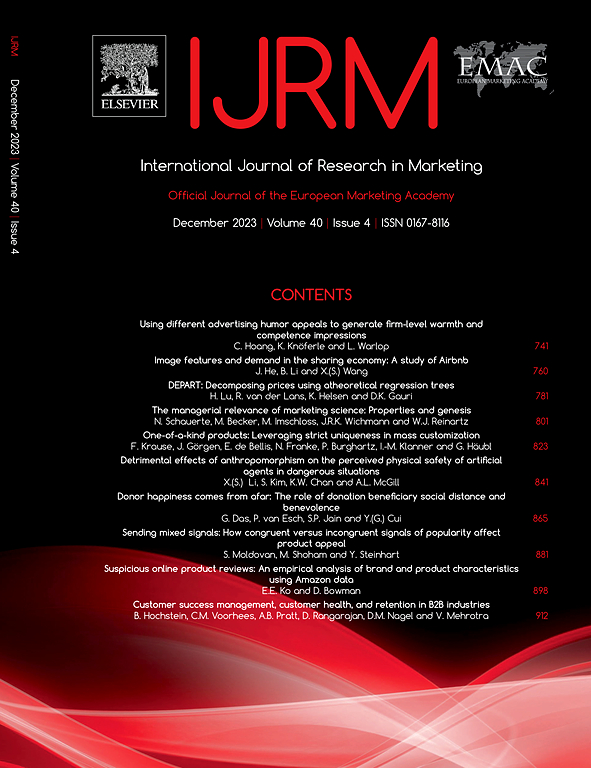Not all AI is created equal: A meta-analysis revealing drivers of AI resistance across markets, methods, and time
IF 7.5
2区 管理学
Q1 BUSINESS
International Journal of Research in Marketing
Pub Date : 2025-09-01
DOI:10.1016/j.ijresmar.2025.02.005
引用次数: 0
Abstract
While artificial intelligence (AI) is used by billions of consumers daily through tools like ChatGPT, prior research often documents that consumers are resistant to it. The current research proposes that such resistance is strongly context-dependent, rapidly evolving, and often an artifact of how researchers study it. We provide a comprehensive synthesis of consumer responses to AI by analyzing 440 effect sizes from 76,142 unique participants across two decades of experimental research. Our meta-analysis reveals three key insights about consumer aversion towards AI (average Cohen’s d = −0.21). First, consumer responses vary systematically by AI label and domain, with the most negative responses to embodied forms of AI (e.g., robots) compared to AI assistants or mere algorithms. We also identify substantial domain differences in areas such as transportation and public safety, which trigger more negative responses compared to areas where AI improves productivity and performance, such as in business and management. Second, we document a temporal evolution towards increasingly less negative responses, particularly for cognitive consumer responses (e.g., performance or competence judgements), with aversion approaching a null-effect in most recent years. Third, we demonstrate overall shrinking effect sizes with greater ecological validity. This work advances our understanding of when and why consumers resist AI and provides directions for future research on consumer-AI interactions.
并非所有人工智能都是平等的:一项荟萃分析揭示了不同市场、方法和时间对人工智能的抵制驱动因素
尽管每天有数十亿消费者通过ChatGPT等工具使用人工智能(AI),但之前的研究往往表明,消费者对它持抵制态度。目前的研究表明,这种耐药性与环境密切相关,发展迅速,而且往往是研究人员如何研究它的产物。在20年的实验研究中,我们通过分析76,142名独特参与者的440个效应值,全面综合了消费者对人工智能的反应。我们的荟萃分析揭示了消费者对人工智能厌恶的三个关键见解(平均科恩d = - 0.21)。首先,消费者的反应因人工智能标签和领域而异,与人工智能助手或单纯的算法相比,消费者对人工智能的具体形式(如机器人)的反应最为负面。我们还确定了交通和公共安全等领域的重大领域差异,与人工智能提高生产力和绩效的领域(如商业和管理)相比,这些领域引发了更多的负面反应。其次,我们记录了一个逐渐减少负面反应的时间演变,特别是对于认知消费者反应(例如,表现或能力判断),厌恶在最近几年接近零效应。第三,我们证明了整体收缩效应具有更大的生态效度。这项工作促进了我们对消费者何时以及为何抵制人工智能的理解,并为未来消费者与人工智能互动的研究提供了方向。
本文章由计算机程序翻译,如有差异,请以英文原文为准。
求助全文
约1分钟内获得全文
求助全文
来源期刊
CiteScore
11.80
自引率
4.30%
发文量
77
审稿时长
66 days
期刊介绍:
The International Journal of Research in Marketing is an international, double-blind peer-reviewed journal for marketing academics and practitioners. Building on a great tradition of global marketing scholarship, IJRM aims to contribute substantially to the field of marketing research by providing a high-quality medium for the dissemination of new marketing knowledge and methods. Among IJRM targeted audience are marketing scholars, practitioners (e.g., marketing research and consulting professionals) and other interested groups and individuals.

 求助内容:
求助内容: 应助结果提醒方式:
应助结果提醒方式:


